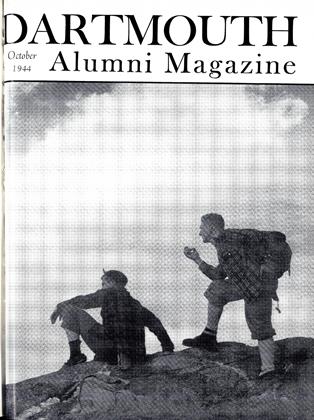LIBRARY EXTENSION UNDER THE WPA AN APPRAISAL OF AN EXPERIMENT IN FEDERAL AID
October 1944 Fred S. HaroldLIBRARY EXTENSION UNDER THE WPA AN APPRAISAL OF AN EXPERIMENT IN FEDERAL AID Fred S. Harold October 1944
by Edward B.Stanford '32. Univ. of Chicago Press, pp.284, $3.00.
At a time when Post-War Planning is the burning question of the day is a most opportune moment for this valuable work to appear. By studying the past we learn to understand the present and hence are in a position to plan the future better. Herein lies the usefulness of Mr. Stanford's book. In making a systematic and thorough study of Federal Library Aid from 1933-1941 he has made a notable contribution not only to Library Extension but also to Post-War Planning.
The growth and evolution of Federal Library Relief Aid is traced from its beginnings in FERA, CWA, CWS, PWA, NYA through to the more highly organized and better administered WPA. Its achievement is graphically depicted by means of numerous tables and figures. Inasmuch as these tell the real story, it is probably the outstanding feature of the book. We learn that in 1940 27,000 persons were employed by the W.P.A. library projects alone on a program involving an annual expenditure of $18,000,000 of federal funds. What is more impressive, from the Post-War Planning angle, is that 40,000,000 people in the U. S. are without library facilities, and about one seventh of these are in urban communities. A vast "useful public project."
Documentary data such as interviews, correspondence, selected statistics, office memoranda, federal law, congressional hearings, books and periodical articles, are used as the essential background for the carefully weighed findings of this efficient study.
The author makes some excellent constructive suggestions after enumerating the strength and weaknesses of the WPA library assistance. Finally, libraries and state library agencies are warned "to begin at once to develop long-range plans for future construction needs and expansion of service which might be undertaken quickly but efficiently as work projects If no such planning is undertaken many libraries will be as unprepared to participate in post-war work programs as they were in 1933."
 View Full Issue
View Full Issue
More From This Issue
-
 Class Notes
Class Notes1917
October 1944 By MOTT D. BROWN JR., DONALD BROOKS -
 Lettter from the Editor
Lettter from the EditorRound the Girdled Earth
October 1944 -
 Article
ArticleAnother Sgt. York
October 1944 By Ivan H. Peterman -
 Article
ArticleDARTMOUTH CASUALTIES
October 1944 -
 Class Notes
Class Notes1918
October 1944 By ERNEST H. EARLEY, DONAI.D L. BARR -
 Class Notes
Class Notes1923
October 1944 By RICHARD B. KERSHAW, WILLIAM C. WHIPPLE JR.
Books
-
 Books
BooksEdward Tuck '62
November 1936 -
 Books
BooksALL THE BEST IN FRANCE,
October 1947 By Charles R. Bagley -
 Books
BooksCountry Newspaper
MARCH, 1927 By D. L. Stone -
 Books
BooksENGLAND ON FIFTY DOLLARS.
June 1934 By Paul G. Allen -
 Books
BooksFree Will and, Human Responsibility: a Philosophical Argument.
April, 1912 By W.H.S. -
 Books
BooksTHE EVOLUTION OF A MEDICAL CENTER: A HISTORY OF MEDICINE AT DUKE UNIVERSITY TO 1941.
NOVEMBER 1972 By WILLIAM L. WILSON '34

